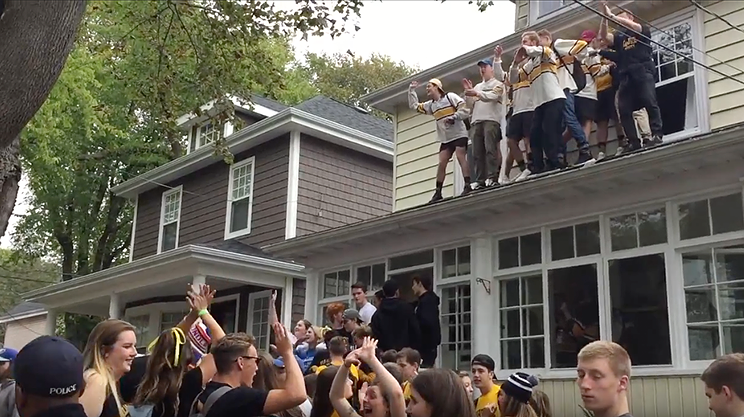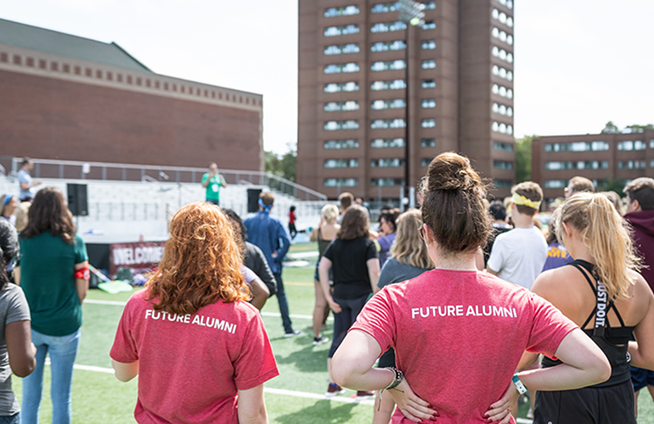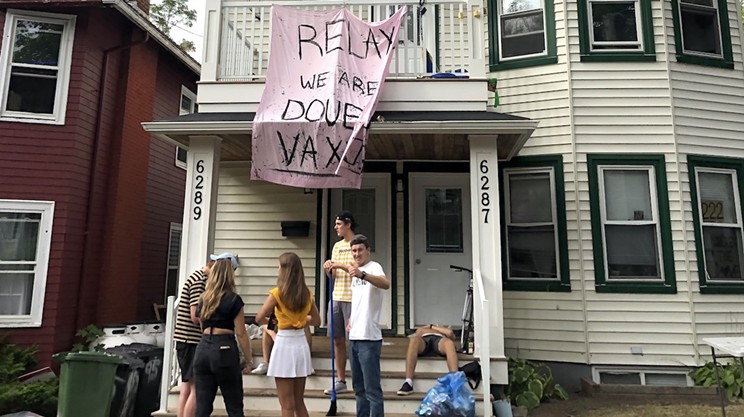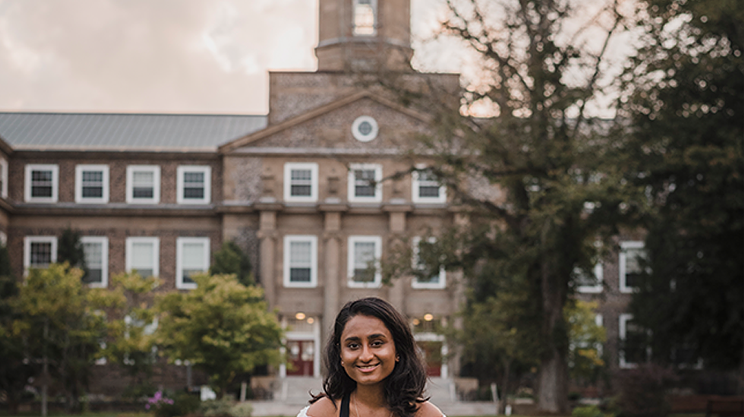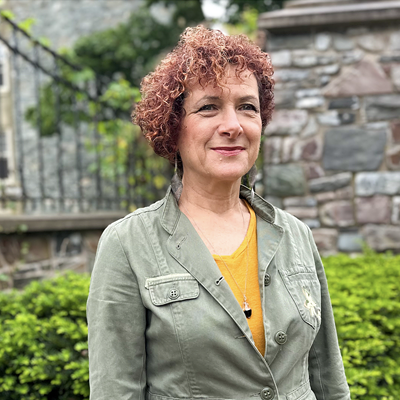Just days after school starts, Nova Scotia could enter the fifth and final phase of its plan for reopening from the worst of the pandemic restrictions, getting on with whatever the new normal of co-existing with COVID-19 for the rest of our lives looks like. The province is expected to enter Phase 5 on September 15, as long as 75 percent of Nova Scotians are fully vaccinated with both doses, and most public health restrictions will be lifted.
Some of the changes in Phase 5 include no gathering limits, no mask requirements and no mandatory physical distancing. While many Nova Scotians will celebrate those changes, many post-secondary schools in the province remain hesitant.
However, one major change that many schools across Nova Scotia have now implemented is COVID-19 vaccine mandates. Over the summer, none of the province's schools had previously made vaccines mandatory for their communities. But as other schools across Canada announced mandatory vaccinations for the upcoming school year, many Nova Scotia schools followed suit.
To clarify the different approaches, The Coast has summarized the fall plans of six Halifax post-secondary schools and how each institution envisions the upcoming academic year.
Dalhousie University
Dalhousie plans to offer a majority of its courses in-person during the fall semester. A few courses will remain online—either synchronous or asynchronous—but students should expect a fall semester that's largely on-campus.
Moreover, the university plans to resume more of its on-campus activities and reopen most of its buildings. That includes opening and resuming on-campus events, library access, food services, study spaces, fitness facilities, residences, dining halls and on-campus research. Faculty and staff are also expected to return to campus with flexible work schedules if necessary.
Since the campus will largely reopen, the university is focused on protecting its community, preventing outbreaks and limiting breakthrough cases. All students, faculty and staff will be required to be vaccinated against COVID-19 and must provide proof before accessing the university's campuses. People who aren't fully vaccinated or choose not to provide vaccination proof will be required to take COVID-19 tests twice a week and provide continuous proof of testing.
Even though Nova Scotia will lift the mask mandate in Phase 5, Dalhousie will still require mask usage through September—and it's considering extending that mandate for the rest of the fall semester.
Dalhousie also conducted a vaccine survey where more than 10,000 students, faculty and staff submitted responses. The university says preliminary results of the survey show that 95 percent of respondents are or plan to be fully vaccinated this fall.
"As we learn to live with COVID-19 and adapt to the spread of new variants, the Dalhousie community needs to continue to do its part to prioritize our collective safety and well-being as many of us return to campus," provost and vice-president academic Frank Harvey says in a letter.
Mount Saint Vincent University
The Mount expects a "significant return to on-campus classes and student life this fall" according to Gillian Batten, the university's director of communications. The university expects a majority of its courses to return to in-person delivery this fall, but also an increase in online course options "for those who need or want to continue to study that way."
For the fall semester, the university's residences will reopen and the school's student union will launch its orientation program for new students (both first years and students who haven't yet been on campus).
Like other local universities, the Mount plans to continue offering services that will benefit its community's health and safety. These services include reduced classroom sizes, improved ventilation, continued mask use in common areas and on-campus rapid testing.
"With a pandemic fourth wave gaining traction across the country at the same time as we seek to safely return to on-campus learning, working, and student life opportunities, a vaccine mandate is an important step," Ramona Lumpkin, the university's interim president and vice-chancellor says in a letter.
Students, faculty and staff will be required to be fully vaccinated against COVID-19 as soon as possible or by Oct. 13 at the latest. Those who choose to not get vaccinated must undergo COVID-19 testing twice a week.
"The evidence is clear: getting vaccinated against COVID-19 is the best way to protect yourself and others, and is our surest way out of this pandemic," Lumpkin says.
Nova Scotia Community College
Many of NSCC's programs will be offered in-person, while some will be delivered in a blended model of both in-person and online courses.
Like other post-secondary schools, NSCC has mandated full COVID-19 vaccinations for students and staff. Proof of vaccination will be required and everyone must be vaccinated by Oct. 12 at the latest.
Anyone who can't be vaccinated or chooses to not get the vaccine must undergo COVID-19 testing twice a week and continue wearing a mask.
The vaccination policy doesn't apply to students who will be learning and accessing services entirely online, but it does come into effect if they plan to attend a campus for any reason.
NSCAD University
In the fall, NSCAD University is fully returning to in-person classes. "We are delighted to be returning to our full complement of face-to-face classes in September," says Martine Durier-Copp, NSCAD's vice president of academic affairs and research.
On top of that, the university is launching NSCAD Online—a platform that'll offer about 50 virtual courses across this academic year.
When it comes to virtual courses, Durier-Copp says "There's an appetite for those students who, perhaps, don't want to relocate to Halifax, who are working and studying part-time, students who face accessibility issues."
Those online options are from a variety of departments and grade levels, meaning students currently can't transition their entire degree to virtual classes. However, Durier-Copp says it's something NSCAD is thinking about for the future.
Once the campus reopens, the university plans to return to hosting in-person events while safety measures will continue to be mandated. Despite Nova Scotia relaxing the rules for masks and physical distancing in the fifth phase, NSCAD isn't dropping those measures. Masks will continue to be required in common areas regardless of vaccination status unless a person is seated at a desk. Physical distancing will also continue in common areas including classrooms and studios.
NSCAD announced a vaccine mandate on Aug. 30; its community members must provide the school with proof of full vaccination before returning to campus. For those who aren't fully vaccinated, NSCAD will require proof of regular testing twice a week. The mandate comes after NSCAD's COVID-19 Vaccination Survey showed 90 percent of respondents are fully vaccinated while 95 percent were committed to being fully vaccinated by the fall term.
Saint Mary's University
At SMU, the majority of courses will be offered in person, but a few will still remain online. Margaret Murphy, the school's associate vice president of external affairs, says it's also possible for students in special circumstances—like a student in their final year who just needs a few more credits—to make arrangements with faculty to virtually take in-person classes.
Still, she says online classes will likely remain an option at the university in the future.
"It's really shaping up to be a large number of in-person opportunities, classes, labs and extra-curricular activities for September," Murphy says. "And more fully back to in-person by January. We do recognize that the fall is a time when we'll be following Public Health's requirements closely."
In September SMU to reopen several buildings including residences, dining locations, athletics facilities and the library. On-campus activities are also planned for students.
At first, SMU only made COVID-19 vaccinations mandatory for students living in residence or participating in varsity and club sports, along with coaches and staff in the Department of Athletics and Recreation unless approved for an exemption.
The university added to the mandate to fall in line with other local universities. All students, faculty and staff will be required to be fully vaccinated before Oct. 15; those who choose not to get vaccinated must test for COVID-19 twice a week at on-campus facilities.
Mask requirements in public spaces will still be enforced, along with all physical distancing requirements.
The university also says it'll regularly report its vaccination rates to its community through online reports.
University of King's College
Since the University of King's College sits on the northwest corner of Dalhousie's campus and students from both universities share courses, both schools have similar back-to-school safety plans.
King's created a Central Safety Plan for the upcoming term reopening in September that claims the university will "reopen to most in-person teaching, residence and campus life activities in September."
Like other schools, King's will extend its own mask-wearing requirement beyond the expected transition to Phase 5. Other public health orders will end—following Nova Scotia's rules—on the date the province enters its fifth reopening phase.
Dalhousie's vaccination mandate will also apply to King's students who take roughly half of their courses at Dalhousie and to those who access the other school's campus. "Dalhousie has committed to discussions with King's about the operational details of these vaccination and testing requirements, considering its broad applicability to King's students, faculty and staff," president and vice-chancellor Bill Lahey says in a letter. However, students who for some reason don't fall under those categories—which shouldn't be many—are still only "encouraged" to be vaccinated.
King's has also followed Dalhousie's steps and conducted their own vaccine survey in July. It was completed by 513 students, faculty and staff—roughly half of those who will be on the university's campus. According to reports from the university, 389 of those respondents are fully vaccinated, 116 people have a single dose, five are getting vaccinated in Nova Scotia and 3 cannot get vaccinated due to medical reasons.


